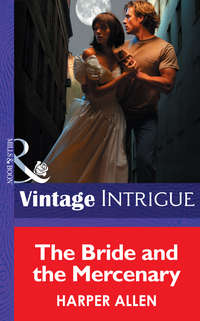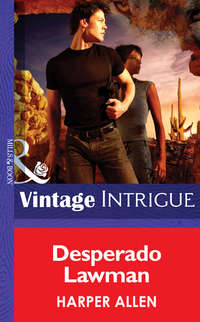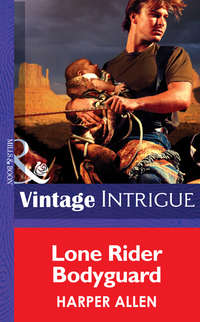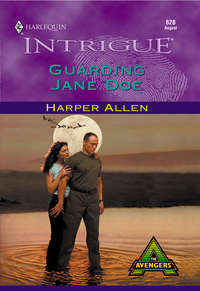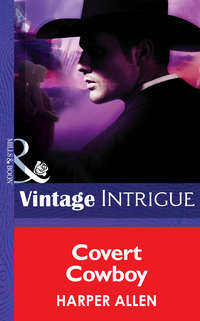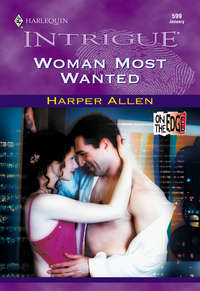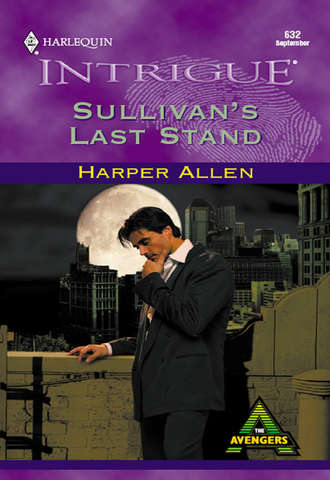
Полная версия
Sullivan's Last Stand
The small object was a shell. Bailey watched it flash and reappear as he unthinkingly maneuvered it between his fingers, like a gambler with one last coin. He saw her watching him, and his fingers stilled.
“That’s pretty. Can I see it?”
She held out her hand, and after an almost imperceptible hesitation he dropped it into her palm. She looked at it more closely. It was fan shaped, with a perfectly round hole in the exact middle of the fan. It was smooth, as if its ridges had been worn down over the years, and instead of being cool, as she had expected, it felt oddly warm in her hand.
She looked up at Sullivan. “How did you drill such a tiny hole—” She halted abruptly, shocked at the expression on his face.
His eyes were dark with pain, and the skin over his cheekbones seemed to have tightened, sharpening the hard angles of his face. His lips were a tautly compressed line, and when he spoke they barely moved.
“I didn’t drill it. It was formed that way, or at least that’s what my father told me. He carried it on him for years. After he died, it was sent to me along with the rest of his final effects, and now I keep it on me, just like he did. He said it was his talisman.”
As if he couldn’t help himself, he held out his hand for the shell and she handed it back. As soon as his fingers wrapped around it, he seemed to relax, and carefully he dropped it into his pocket again.
“Psalm 91,” he said, his voice once more edged with rueful humor. “‘The arrow that flieth by day, the pestilence that walketh in darkness.’ Thomas Sullivan believed that as long as he carried it, he would be protected from them, and now his son’s carrying on the tradition. I guess there’s a little superstition in me after all.”
Superstition hadn’t been the cause of that terrible bleakness she’d seen on his face, Bailey thought, shaken. But she knew the man well enough to realize that if that was what he wanted her to believe, nothing she could say would get anything more out of him. Needing suddenly to bring some semblance of normalcy back to the conversation, she reached for her purse on the chair beside her and pulled out the file.
“I guess this is called withholding evidence,” she said, hoping that her voice sounded steadier than she felt. As if he was just as eager to seize upon a new topic as she was, Sullivan took the slim sheaf of papers she handed him.
“Obstructing the police in the commission of their duties, at least.” He flipped through the first few pages of Jackson’s report, scanning them rapidly. “Nothing here that you didn’t already know, is there?”
“Just details.” She lifted her shoulders. “But they’ll help. He mentions the name of the hotel, for example, and the number of the room Plowright and his playmate were staying in.”
“And the photos he took.” Sullivan was on the last page of the report. “This is a list of them, with a description of where and when each one was taken. Listen to this. ‘Roll 2, frame 16: Subject Plowright beside bed. Unidentified female companion on bed, wearing negligee. Blinds on hotel suite’s French doors fully open.’ He must have been using a telephoto lens to get that shot.”
He handed the report to her. After a moment she looked up from it in disappointment. “That was the spiciest one he got. Before Plowright got down to business he closed the blinds.”
“Yeah, I noticed that. Frame 19 is him, shirtless, closing them, according to Hank’s list.” Sullivan shrugged. “Still, it’s pretty conclusive, even if they weren’t caught on film actually doing the wild thing with each—”
“Little pitchers have big ears, Terry,” a brisk voice said from the doorway. “I know it’s asking a lot of you, but try to keep it clean for the next few minutes.”
Bailey looked up swiftly. The woman who had spoken was fixing Sullivan with a glare from blue eyes that looked a lot like his. Her hair was as almost the same midnight shade as his was, too, and not much longer, its urchinlike cut framing an angry, heart-shaped face. Beside her was a young girl with long coltlike legs and a mane of coppery hair tamed into a thick braid that was coming undone.
Sullivan looked at his watch and then swore under his breath. “I said seven o’clock, didn’t I?” he said weakly. “I’m sorry, Lee. Something came up and I lost track of the time. But you’re here now, so why don’t we—”
“Some things just never change, Terry. Not where the Sullivan men are concerned, anyway.” The dark-haired woman’s expression was tight and closed. “It’s way after regular office hours, so I’m guessing this isn’t a business appointment.”
She jerked her head stiffly at Bailey, her voice rising. “Like father, like son. It’s obvious that you can’t fit into a normal life any more than Thomas could. Why don’t you just go back to being a damned mercenary, like he did in the end?”
Chapter Four
Swiftly Ainslie turned on her heel. Shooting an agonized look of apology at Sullivan, the young redhead—Tara, Bailey guessed—followed her down the hall. Bailey waited for Sullivan to go after them and work his charm on his sister, but to her surprise he simply stood there, his hands clenched into fists at his sides, his eyes shadowed.
“I screwed up,” he said harshly. “And with Lee, of all people. Dammit, I knew how fragile this relationship was—how the hell could I have let her down in exactly the same way.”
She didn’t understand all the ramifications of the scene she’d just witnessed, Bailey thought swiftly, but she knew one thing. For some reason her presence had seemed to be the decisive element for Sullivan’s sister, the factor that had turned her anger to pain.
Some things never change—not where the Sullivan men are concerned…There’d been a rawness in Ainslie’s voice as she’d made the accusation, and it had been the rawness of a wound that had never fully healed. She’d been there herself, Bailey thought in resignation. She knew what it felt like.
“For heaven’s sake,” she muttered, getting quickly out of her chair and striding to the doorway. “Covering your butt was the last thing I expected to be doing when I came here today, Sullivan.”
She saw them as soon as she stepped into the hallway. Standing by the vacant reception desk—Moira had left for the day just after Fitzgerald and Straub had arrived—they were waiting for the elevator to arrive, and their discussion looked heated. Tara, almost as tall as Ainslie but with the awkward slenderness of a preteen, had her arms crossed tensely in front of her. Despite her antagonistic attitude and the trendy clothes she was wearing—a skinny baby tee that stopped just south of her belly button and jeans that rode low on her nonexistent hips—she only succeeded in looking heartbreakingly young and miserable.
Ainslie, on the other hand, appeared to have regained a little of her composure. She was wearing an outfit that was simply a more mature version of her goddaughter’s—jeans and a multicolored sweater—but instead of looking vulnerable, she looked ready to punch in the elevator door. She was probably more than capable of doing so, Bailey thought nervously. Sullivan had mentioned once that Ainslie had boxed professionally in a women’s featherweight division for a time, and now she trained her own fighters at the gym that she ran downtown.
But I know karate, Bailey told herself hollowly, advancing on them with a confidence she didn’t feel. Besides, I made it to the finish in the Boston Marathon last year. I can probably outrun her.
“If you’re here to relay an apology from my big brother, tell him to forget it,” Ainslie snapped. She jabbed at the elevator call button impatiently. “And tell him his damned elevator’s just as unreliable as he is,” she added with an edge of frustration.
“He’s not unreliable, Auntie Lee.” Tara’s bottom lip stuck out pugnaciously. “What’s your problem with Uncle Sully, anyway? You didn’t even let him explain why he hadn’t shown up!”
“I didn’t need to hear his explanation. The O’Connell women have heard enough explanations from the Sullivan men over the years, and I’m about to end the tradition right here and now. It’s her birthday, for crying out loud.” Ainslie directed this last sentence to Bailey, and her eyes were glittering with unshed tears. “Maybe you two had a hot date or something, but I would have thought even Terry would consider a young girl’s thirteenth birthday dinner a little more important than his latest conquest.”
“I’m not his latest conquest,” Bailey finally managed to interject. “I’m last year’s,” she added dryly. “Which means that whatever you’ve got against him, I’d normally be on your side, except that this time it really wasn’t his fault. One of his men went missing, and the police were here questioning him up until half an hour ago. You’re lucky he didn’t have to phone you from jail to make bail for him.”
Ainslie’s stunned gaze went past her, and Bailey turned to find Sullivan behind her. “It’s true, Lee, but that’s no excuse. I should have phoned you. I’m sorry.”
“Who’s missing?” His sister ignored his apology.
“Hank Jackson.” He grimaced. “You’ve heard me speak of him—he’s been with the agency since before I took it over from Uncle Sean. We think it might be tied to a case that Bailey was involved with.”
“Bailey?” The navy gaze, not quite as dark as her brother’s, switched back to Bailey and widened. “As in Flowers?”
“Cut it out, sis.” Sullivan’s tone was sharp, but it softened as he turned to Tara. “What a babe,” he said admiringly. “New jeans, new top…” He paused and peered closely at the pink-cheeked young face. “And if I’m not mistaken, my little sister’s finally caved in on the no-makeup rule now that you’re officially a teenager. Is that eye shadow you’re wearing?”
“Eye glimmer.” Tara’s blush deepened. “And lip gloss, too.”
“Only for special occasions, and I’d better not catch you wearing it to school yet, young lady,” warned Ainslie with mock gruffness. “The nuns would have my hide.”
The elevator chose that moment to open, and on impulse Bailey turned to Sullivan. “I should leave. We can go over the Plowright file tomorrow and decide where we’re going to take it from here,” she said swiftly. “Why don’t you three keep that pizza date you had planned?”
“I’ve got a better idea.” Ainslie looked up at her brother, and before her features assumed their normally wry expression, Bailey saw a flash of loving concern pass across her face. “Why don’t we order in here? It’ll still be a party, but you and Bailey will have a chance to look over the file and make plans. I know you’re worried about Hank, Terry,” she added quietly.
“Cool!” Tara’s eyes lit up with excitement. “While we’re waiting for the pizza, can I log on to the Internet on your computer and e-mail my friends, Uncle Sully?”
“I guess so.” Sullivan raised a dubious eyebrow. “But from now on you’re going to have to use your own at home, sweetheart. I can’t have you on mine all the time.”
“But I don’t have one at—” The inexpertly glossed mouth dropped open and the green eyes, beautiful despite the smear of shine that decorated each lid, widened. “You got me a computer for my birthday?” she squealed incredulously. “Oh, Uncle Sully, you’re the greatest!”
She wrapped her arms around him, almost knocking him backward, and over her head he grinned weakly at his sister. “Don’t be mad, Lee. I know you said it was too extravagant, but I wanted to. I’ll cover the Internet charges, and I arranged for an extra phone line so yours wouldn’t be tied up all the time. I hope you like lime,” he said to the top of Tara’s head. She was still hugging him. “Because that’s the color I got. I thought it would go with those cat’s-eyes of yours, sugar.”
“I love lime! Is it here? Can we see it?” Tara turned to Ainslie, her face alight. “Do you mind phoning for the pizza while Uncle Sully shows me my computer, Auntie Lee? Double cheese, no anchovies, and pineapple on half, okay?”
“Only because it’s your birthday.” Ainslie shuddered, and then flapped her hand at her brother and her goddaughter. “Go on, Bailey and I can manage to order a pizza, I guess. I’ll tell Martin at the security desk downstairs we’re expecting a delivery.”
“Order one for him and Mike, too.” Fishing his wallet out of his pocket with difficulty, since Tara was still clinging to him like a limpet, Sullivan grinned. “But ask them first if they want pineapple on theirs. Their palates might not be sophisticated enough to handle it.”
“My palate’s not sophisticated enough. Or maybe it’s just that I’m not a teenager anymore,” Ainslie said wryly to Bailey as she slipped behind Moira’s desk and punched in a number on the phone.
From Sullivan’s office a couple of doors down the hall came a series of high-pitched exclamations, interspersed with the deeper tones of Sullivan explaining the features of Tara’s new computer to her. Ainslie caught Bailey’s amused expression and grinned herself.
“He’s a pushover, but then so am I when it comes to her,” she said ruefully. “She’s a good kid. I just hope I’m raising her the way her mother would have wanted me to.”
Within a matter of minutes, she’d placed the orders. The more subdued murmurs now coming from Sullivan’s office seemed to signify that he and Tara had passed the bells-and-whistles stage of the computer demonstration and were now getting down to exploring its more complicated capabilities. Ainslie tipped her head to one side, listening.
“Nah,” she said decisively. “I’m not going in. I might have been able to help them get it out of the box, but that’s about where my expertise ends. No need to give them a chance to feel too superior to me.”
“It sounds like they’re getting along fine without us,” Bailey agreed with a smile. “Tara’s your adopted daughter?”
They entered the conference room and Ainslie pulled out one of the comfortably upholstered chairs that ringed the massive table. With a sigh she sat down, leaning back and propping her crossed legs on the gleaming tabletop. Her pose was almost identical to the one that Sullivan had been assuming when she’d first walked in on him in his office this morning, Bailey noted with amusement. It seemed that the two of them were alike in some ways, at least. She sat down herself, pushing the Plowright file aside for the moment.
“Her mom was my cousin.” Ainslie raked back her glossy black bangs and met Bailey’s gaze. “She got pregnant when she was a teenager herself, but instead of giving the baby up for adoption she insisted on keeping it. Everybody told her she was crazy, even the teenaged father, who promptly moved with his family out of state. But when Tara was born the whole O’Connell clan fell in love with her.” Her smile was touched with sadness. “Seven years later Babs was gone. Leukemia,” she said briefly. “It was as if she’d known she only had one chance to be a mother, and she’d made the most of it. Tara was her pride and joy.”
“She must have been very close to you to leave her daughter in your care,” Bailey said gently.
“Her mother was my mom’s sister, and we moved in with them when my father left, so yeah, we were close.” Ainslie looked over at her. “Thomas Sullivan was my father, but he just wasn’t the type to settle down with one woman and a family, even though he already had a son from his first marriage. He was almost as good-looking as Terry is now, and women just couldn’t resist him. He couldn’t resist them, either. When my mother realized he was never going to change, she gave him his walking papers and he was gone, taking Terry with him. I was five years old, and I lost my father and my adored big brother in one day,” she said softly. “I never saw Thomas again, and I didn’t see Terry for years. We don’t even share the same last name anymore—Mom changed it back after the divorce.”
And that explained much of her reaction half an hour ago, Bailey thought with a rush of compassion. Ainslie O’Connell might be tough enough to deal with the sweat and blood of a boxing ring, but some part of her was still that little five-year-old who only knew that the males in her life had walked out one night and never come back to her. No wonder she was so wary with her brother—half brother, Bailey corrected herself. But how had it been for Sullivan? He would have been around Tara’s age when his feckless charmer of a father had uprooted him for the second time in his life, continuing with him on the restless journey that apparently had been Thomas Sullivan’s life.
“It sounds like Sully inherited more from his father than just those black Irish good looks,” she hazarded.
“From what you said, I guess you’ve got firsthand knowledge of that.” Ainslie put up a hand, frowning. “I’m not prying. But you’re the only one of his women he ever mentioned by name.”
“I wouldn’t make too much of that if I were you,” Bailey said impassively. “Your brother’s moved on since last year, and so have I. I really did come here to see him on business today.”
“That’s too bad.” Under straight dark brows, Lee looked appraisingly at her. “I’ve got a feeling that only the love of a good woman is going to be enough to save the man.”
Bailey felt an uncomfortable prickling sensation run down the length of her spine at Ainslie’s words. It was the second time today someone had tried to cast her in the role of Terrence Sullivan’s savior, she thought sharply. If that was the impression she was giving out, she wanted to dispel it—and fast.
“I’m sure he’ll have no trouble finding plenty of takers for the position,” she said. “But right now I’ve got a more immediate problem to worry about, and so does he. I seem to have mislaid a sister, and his best operative’s gone missing.”
She’d just finished sketching out the details of Angelica’s disappearance and their discovery of Jackson’s trashed home office when Sullivan joined them. He was bearing a large flat box, and under one arm he had three cans of cola that were in danger of falling. Ainslie jumped up and took them from him as he set the pizza box down on the table.
“Where’s the birthday girl?” she asked, pulling a wad of paper serviettes from his back pocket and lifting up the pizza box just high enough to slip a nearby telephone book underneath. “Really, Terry, it’s mahogany,” she chided distractedly.
“The little ingrate asked if she could have hers at the computer. I said we’d be glad not to watch her eating her revolting fruit-topped concoction.” He flipped open the lid of the box. “Pepperoni, tomatoes and onions. Now that’s the way God intended pizza to be.”
“Which is why He invented mouthwash,” his sister said dryly. “But as long as we’re all on the same garlicky playing field, I guess it doesn’t matter.”
She lifted a slice from the box and took a bite. Bailey and Sullivan did the same, and for a minute or so all that disturbed the silence of the elegantly appointed conference room were the sounds of chewing and the occasional murmur of appreciation from Ainslie.
“Good pizza,” she said, daintily licking her fingers and taking another piece. “Bailey was telling me about her sister’s marital woes, Terry. How can you be so sure Angelica’s case has anything to do with Hank’s disappearance? Come to that, how can you be sure that Angelica’s disappearance has got anything to do with what’s in that report? After all,” she added apologetically to Bailey, “from the way you describe her it sounds as if she might just have taken off for a few days to nurse her wounded pride. Is she the type to do something drastic?”
“I wouldn’t have said so if you’d asked me a week ago.” Bailey shrugged and took another slice of pizza herself. “And I still don’t think she threw herself off the nearest bridge or anything like that. But she was upset when she left that message on my machine—it’s entirely possible that she’s decided to pay Aaron back in his own coin.”
“A little fling?” Ainslie raised an eyebrow. “Isn’t that slightly rash, when he’s the one with the money? And I presume the money’s important to her, since there’s a thirty-year gap in their ages.”
“Oh, the money’s important to my sister.” Bailey gave a humorless smile. “She was determined to hold out for a millionaire.”
“You don’t sound like the two of you are that close,” Ainslie said cautiously. Sullivan shot her a warning look, but after a moment’s hesitation Bailey answered her.
“I’d like to have been closer, and maybe it was my fault we weren’t,” she said slowly. “I know that since our parents were killed in a car accident six years ago, Angelica made it clear that she was going to live her own life, with no interference from me. At seventeen she quit school, found a job and rented an apartment with a couple of other girls. It wasn’t until a lot later that I learned she was working underage in a bar, thanks to some fake ID an obliging boyfriend had obtained for her. But even from the day she became part of the family, I felt as if she saw me as competition. It wasn’t hard to figure out where that came from, though,” Bailey added fairly. “Her mother had been an addict, and from the little I know about the first five years of Angel’s life, love was a pretty scarce commodity. It’s no wonder she went for something she could actually be sure of when she married.”
“How sure?” Sullivan said suddenly. “Aaron Plowright, as determined as he must have been to get his new little eighteen-year-old plaything into his bed one way or another, certainly wasn’t a lovesick boy when it came to his fourth marriage. Did he get her to sign a prenuptial agreement?”
Bailey looked at him, startled. Slowly she dabbed at her lips with the serviette, her gaze thoughtful. “I seem to remember she did, although she wasn’t happy about it. Like I said, Angelica’s blond and she puts on that dumb act when it suits her, but she’s not stupid when it comes to money.”
“Which means it’s also unlikely she’d be impulsive enough to jeopardize her marital status by fooling around.” Ainslie eyed the last slice of pizza in the box and then shook her head. “You take it, big guy.”
“I hadn’t thought of that, but you’re right,” Bailey said, her gaze darkening. “Dammit, if my little drama queen of a sister staged that phone message just for effect, I’m going to wring her neck when I see her!”
“I’d say go for it, except for one thing,” Sullivan said with a frown. “Hank’s missing, too.”
Ainslie fiddled unnecessarily with the lid of the pizza box, and Bailey looked down at her hands. Neither of them spoke, and Sullivan’s jaw tightened.
“I thought you agreed with me on this.” His tense comment was directed at Bailey, and reluctantly she met his gaze.
“I’ll admit, back at his house I was halfway convinced. The fact that you say he can’t drink rye, the missing towels, the wrecked computer, the files all over the floor.” She bit her bottom lip. “But to be honest, I think it was the atmosphere that really got to me. For some reason I had the creeps the whole time we were there.”
She shrugged helplessly. “But don’t you see, Sully, there was nothing there that couldn’t be explained away, if only you’d accept that Jackson—” She broke off, not wanting to complete the sentence. Ainslie did it for her.
“He’s a friend, and you’re loyal to a fault to your friends, bro,” she said brusquely. “But he likes the bottle, and when he’s gone off the wagon in the past he’s been a mean drunk. He even trashed the office of Sullivan Investigations when it was just a two-man operation in that seedy location in the South End years ago. Uncle Sean almost fired him over that, remember?”
“Sean liked the bottle a little too well himself, and his stories always got embellished in the telling,” Sullivan said tightly. “Hank never tried to hide the fact that he had a problem, but in the past few years he’s gotten it under control. What are you saying—that he trashed those files himself?”
He sounded incredulous, and Bailey saw Ainslie’s eyes spark with anger. “At least admit it’s a possibility,” she snapped. “For God’s sake, loyalty is one thing, but there comes a point where you have to turn your back and walk away.”
“I did that once.” Her brother’s voice was ice. “I promised myself I’d never do it again. Jackson’s one of my men, Lee, and I won’t let him down. I’m going to find him, and if anything’s happened to him I’m going to find the person who did it.”


